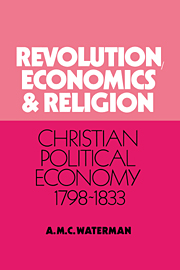Book contents
- Frontmatter
- Contents
- List of figures
- Acknowledgements
- Abbreviations
- 1 POLEMIC, IDEOLOGY AND ‘CHRISTIAN POLITICAL ECONOMY’
- 2 THE FIRST ESSAY ON POPULATION: POLITICAL ECONOMY
- 3 THE FIRST ESSAY ON POPULATION: THEOLOGY
- 4 THE RECONSTRUCTION OF MALTHUSIAN THEODICY: PALEY AND SUMNER
- 5 OXFORD CONTRIBUTIONS: COPLESTON AND WHATELY
- 6 CHALMERS AND THE ESTABLISHMENT
- 7 THE END OF CHRISTIAN POLITICAL ECONOMY
- Appendices: The Malthus–Chalmers model of stationary equilibrium
- Bibliography
- Index
3 - THE FIRST ESSAY ON POPULATION: THEOLOGY
Published online by Cambridge University Press: 27 August 2009
- Frontmatter
- Contents
- List of figures
- Acknowledgements
- Abbreviations
- 1 POLEMIC, IDEOLOGY AND ‘CHRISTIAN POLITICAL ECONOMY’
- 2 THE FIRST ESSAY ON POPULATION: POLITICAL ECONOMY
- 3 THE FIRST ESSAY ON POPULATION: THEOLOGY
- 4 THE RECONSTRUCTION OF MALTHUSIAN THEODICY: PALEY AND SUMNER
- 5 OXFORD CONTRIBUTIONS: COPLESTON AND WHATELY
- 6 CHALMERS AND THE ESTABLISHMENT
- 7 THE END OF CHRISTIAN POLITICAL ECONOMY
- Appendices: The Malthus–Chalmers model of stationary equilibrium
- Bibliography
- Index
Summary
WHY THEOLOGY?
‘It is, undoubtedly, a most disheartening reflection, that the great obstacle in the way to any extraordinary improvement in society, is of a nature that we can never hope to overcome’ (Malthus 1798, 346). That obstacle, of course, is the principle of population and the political economy which it implies. No good can come of ignoring this unwelcome fact: ‘on the contrary, the most baleful mischiefs may be expected from the unmanly conduct of not daring to face the truth’ (346). With a right understanding of political economy ‘sufficient yet remains to be done for mankind, to animate us to the most unremitted exertion’ (347). But if we hasten to remedy the ills of society without proper knowledge, and so ‘unwisely direct our efforts towards an object, in which we cannot hope for success’, we must ‘remain at as great a distance as ever from the summit of our wishes’, and risk being ‘perpetually crushed by the recoil of this rock of Sisyphus’ (347).
With these words Malthus concluded chapter XVIII of the first Essay, and there, one might now suppose, he could have rested his case against the Jacobins. It is conventional to regard the last two chapters as detachable, a view which Malthus himself encouraged by his omission of their argument from later editions of the Essay. ‘Perhaps,’ conjectured Bonar (1924, 38), ‘the great economist went beyond his province in attacking the problem of evil’.
- Type
- Chapter
- Information
- Revolution, Economics and ReligionChristian Political Economy, 1798–1833, pp. 58 - 112Publisher: Cambridge University PressPrint publication year: 1991

